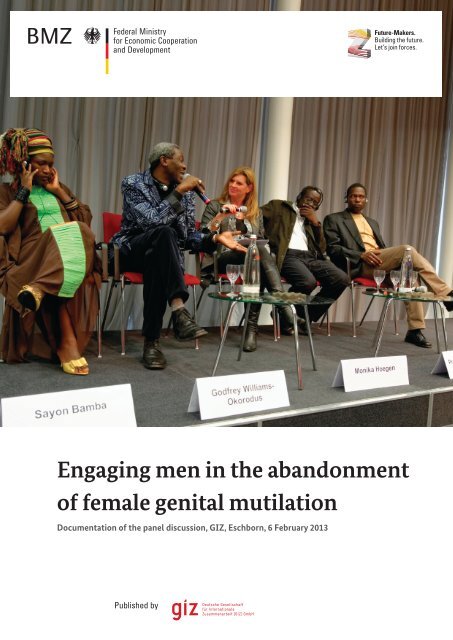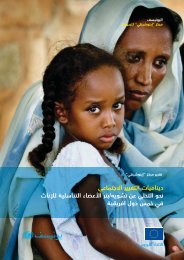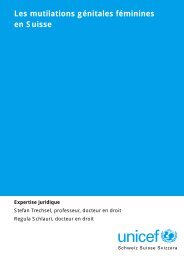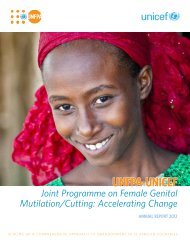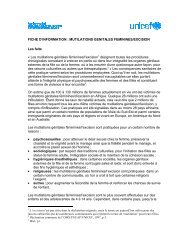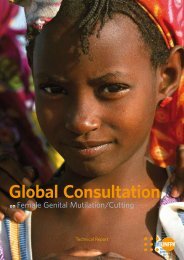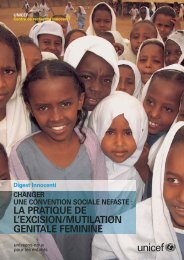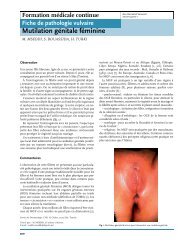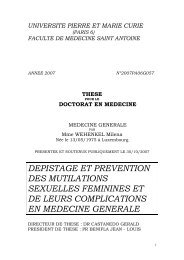Engaging men in the abandonment of female ... - Intact-network.net
Engaging men in the abandonment of female ... - Intact-network.net
Engaging men in the abandonment of female ... - Intact-network.net
You also want an ePaper? Increase the reach of your titles
YUMPU automatically turns print PDFs into web optimized ePapers that Google loves.
<strong>Engag<strong>in</strong>g</strong> <strong>men</strong> <strong>in</strong> <strong>the</strong> abandon<strong>men</strong>t<br />
<strong>of</strong> <strong>female</strong> genital mutilation<br />
Docu<strong>men</strong>tation <strong>of</strong> <strong>the</strong> panel discussion, GIZ, Eschborn, 6 February 2013
2<br />
<strong>Engag<strong>in</strong>g</strong> <strong>men</strong> <strong>in</strong> <strong>the</strong> abandon<strong>men</strong>t <strong>of</strong> <strong>female</strong> genital mutilation<br />
Dialogue,<br />
arts and<br />
<strong>the</strong> right<br />
language<br />
On <strong>the</strong> occasion <strong>of</strong> <strong>the</strong> tenth<br />
International Day <strong>of</strong> Zero Tolerance to<br />
Female Genital Mutilation (FGM), <strong>the</strong><br />
Deutsche Gesellschaft für Internationale<br />
Zusam<strong>men</strong>arbeit (GIZ) GmbH organised<br />
an afternoon event at its headquarters <strong>in</strong><br />
Eschborn, which focused on how to engage<br />
<strong>men</strong> <strong>in</strong> combat<strong>in</strong>g FGM. The lively<br />
event comprised a panel discussion, a<br />
musical performance by <strong>the</strong> Gu<strong>in</strong>ean<br />
s<strong>in</strong>ger Sayon Bamba and her band, and<br />
an exhibition <strong>of</strong> pa<strong>in</strong>t<strong>in</strong>gs by Nigerian<br />
artist Godfrey Williams-Okorodus<br />
and o<strong>the</strong>r Nigerian, Burk<strong>in</strong>a Faso and<br />
Canadian artists.<br />
‘Men should act as change agents’<br />
Mart<strong>in</strong> Müller, Director <strong>of</strong> East Africa Division, GIZ<br />
In his welcome address, Mart<strong>in</strong> Müller stressed <strong>the</strong> important role <strong>men</strong><br />
play <strong>in</strong> end<strong>in</strong>g <strong>female</strong> genital mutilation. Religious leaders, doctors,<br />
teachers and politicians <strong>in</strong> particular have <strong>the</strong> potential to act as change<br />
agents <strong>in</strong> this process and need to become more <strong>in</strong>volved. He highlighted<br />
GIZ’s successful work <strong>in</strong> combat<strong>in</strong>g FGM: s<strong>in</strong>ce 1999, on behalf <strong>of</strong> <strong>the</strong><br />
German Federal M<strong>in</strong>istry for Economic Cooperation and Develop<strong>men</strong>t<br />
(BMZ), GIZ has been imple<strong>men</strong>t<strong>in</strong>g <strong>the</strong> supraregional project ‘End<strong>in</strong>g<br />
Female Genital Mutilation’; and, s<strong>in</strong>ce 2009, an advisory project <strong>of</strong> <strong>the</strong><br />
same name. Currently, GIZ is focus<strong>in</strong>g its support on programmes and<br />
projects <strong>in</strong> Mauritania, Sierra Leone, Gu<strong>in</strong>ea and Burk<strong>in</strong>a Faso. One <strong>of</strong> <strong>the</strong><br />
biggest successes so far has been <strong>the</strong> issu<strong>in</strong>g <strong>of</strong> a fatwa aga<strong>in</strong>st FGM by a group <strong>of</strong> religious<br />
leaders <strong>in</strong> Mauritania, which has subsequently been adopted <strong>in</strong> n<strong>in</strong>e o<strong>the</strong>r West African<br />
Muslim countries. ‘We are proud to say that success <strong>in</strong> <strong>the</strong> fight aga<strong>in</strong>st FGM is possible,<br />
despite a lot <strong>of</strong> scepticism,’ Müller stated.<br />
‘FGM violates a woman’s personal freedom’<br />
An<strong>net</strong>te Bähr<strong>in</strong>g, Head <strong>of</strong> <strong>the</strong> Competence Centre for Key Issues <strong>in</strong><br />
Good Governance, GIZ<br />
In her presentation, An<strong>net</strong>te Bähr<strong>in</strong>g expressed <strong>in</strong> unequivocal terms<br />
that FGM constitutes a severe and irreversible form <strong>of</strong> violence aga<strong>in</strong>st<br />
girls and wo<strong>men</strong>, harm<strong>in</strong>g or destroy<strong>in</strong>g all <strong>the</strong>ir outer sexual organs and<br />
caus<strong>in</strong>g psychological damage. ‘There is no doubt that we have to call it a<br />
serious human rights violation,’ Bähr<strong>in</strong>g affirmed. Apart from <strong>in</strong>jur<strong>in</strong>g <strong>the</strong><br />
body, FGM also seriously restricts a woman’s personal freedom, as she can
Docu<strong>men</strong>tation <strong>of</strong> <strong>the</strong> panel discussion<br />
3<br />
no longer determ<strong>in</strong>e her own sexual and emotional life or her personal develop<strong>men</strong>t. Bähr<strong>in</strong>g<br />
went on to describe FGM as ‘part <strong>of</strong> <strong>the</strong> structural <strong>in</strong>equality between <strong>men</strong> and wo<strong>men</strong>.’ That<br />
is why <strong>the</strong> fight aga<strong>in</strong>st FGM must be embedded <strong>in</strong> efforts for good governance and gender<br />
equality. Bähr<strong>in</strong>g also focused attention on several important <strong>in</strong>ternational conventions<br />
relat<strong>in</strong>g to <strong>the</strong> violation <strong>of</strong> wo<strong>men</strong>’s rights, such as CEDAW (Convention on <strong>the</strong> Elim<strong>in</strong>ation<br />
<strong>of</strong> All Forms <strong>of</strong> Discrim<strong>in</strong>ation aga<strong>in</strong>st Wo<strong>men</strong>, 1979), <strong>the</strong> Maputo Protocol (The Protocol to<br />
<strong>the</strong> African Charter on Human and Peoples’ Rights on <strong>the</strong> Rights <strong>of</strong> Wo<strong>men</strong> <strong>in</strong> Africa, 2003),<br />
and <strong>the</strong> UN Resolution aga<strong>in</strong>st FGM, adopted <strong>in</strong> December 2012. Fur<strong>the</strong>rmore, FGM will be<br />
an issue under discussion at <strong>the</strong> 57th session <strong>of</strong> <strong>the</strong> UN Commission on <strong>the</strong> Status <strong>of</strong> Wo<strong>men</strong><br />
to be held <strong>in</strong> March 2013 <strong>in</strong> New York City. This will also be an opportunity for GIZ to present<br />
its work on combat<strong>in</strong>g FGM <strong>in</strong> West Africa. Bähr<strong>in</strong>g asserted that cooperation between state<br />
actors and non-govern<strong>men</strong>tal organisations is extremely important. GIZ works with Integra,<br />
a German <strong><strong>net</strong>work</strong> <strong>of</strong> NGOs fight<strong>in</strong>g FGM, which seeks to protect wo<strong>men</strong> and girls at risk <strong>of</strong><br />
undergo<strong>in</strong>g FGM procedures.<br />
In search <strong>of</strong> conv<strong>in</strong>c<strong>in</strong>g argu<strong>men</strong>ts<br />
Gu<strong>in</strong>ean s<strong>in</strong>ger Sayon Bamba and Nigerian artist Godfrey Williams-Okorodus participated <strong>in</strong><br />
<strong>the</strong> panel discussion, alongside Pr<strong>of</strong>essor Abdoulaye Sow from Mauritania and Dr. Abdoulaye<br />
Zono, a GIZ advisor who has worked <strong>in</strong> Mali and <strong>the</strong> Democratic Republic <strong>of</strong> Congo. Monika<br />
Hoegen, a journalist who specialises <strong>in</strong> develop<strong>men</strong>t issues moderated <strong>the</strong> discussion. The<br />
ma<strong>in</strong> argu<strong>men</strong>ts put forward by each panelist are presented below.<br />
‘Art is <strong>the</strong> subtlest language for address<strong>in</strong>g issues like this’<br />
Godfrey Williams-Okorodus, born <strong>in</strong> 1970, is a Nigerian artist and<br />
pa<strong>in</strong>ter who has dedicated a large part <strong>of</strong> his work to <strong>the</strong> struggle<br />
aga<strong>in</strong>st FGM. He created <strong>the</strong> series ‘Soul Gazers’, 50 portraits <strong>of</strong><br />
unknown wo<strong>men</strong> affected by excision. The backgrounds <strong>of</strong> <strong>the</strong>se<br />
colourful pa<strong>in</strong>t<strong>in</strong>gs consist <strong>of</strong> play<strong>in</strong>g cards, symbolis<strong>in</strong>g life<br />
as it should be: full <strong>of</strong> joy, colours and lucky streaks. However,<br />
each woman’s face is covered by a metal mask, symbolis<strong>in</strong>g <strong>the</strong><br />
blade that destroys her body and life. The wo<strong>men</strong>’s faces are kept<br />
hidden, which prevents <strong>the</strong> onlooker from gaz<strong>in</strong>g <strong>in</strong>to <strong>the</strong>se<br />
wo<strong>men</strong>’s souls.<br />
What reactions do you get as an artist to your anti-FGM work<br />
The reactions are ra<strong>the</strong>r mixed. I have shown my work <strong>in</strong> very<br />
different countries, like Nigeria, <strong>the</strong> United States, Belgium and<br />
Germany, and I must say that <strong>the</strong> audience <strong>in</strong> <strong>the</strong> U.S. seems to be<br />
more sensitised. In Europe, <strong>the</strong> work has not received <strong>the</strong> same<br />
k<strong>in</strong>d <strong>of</strong> attention.
4<br />
<strong>Engag<strong>in</strong>g</strong> <strong>men</strong> <strong>in</strong> <strong>the</strong> abandon<strong>men</strong>t <strong>of</strong> <strong>female</strong> genital mutilation<br />
How was <strong>the</strong> reaction <strong>in</strong> Nigeria<br />
A lot <strong>of</strong> people <strong>in</strong> Nigeria, especially <strong>in</strong> <strong>the</strong> South, don’t know much about <strong>the</strong> practice, as it<br />
ma<strong>in</strong>ly takes place <strong>in</strong> <strong>the</strong> rural North. This meant it wasn’t so easy to broach <strong>the</strong> issue with<br />
<strong>the</strong>m. That said, I haven’t been openly attacked – that is, except by one Kenyan woman who<br />
was angry to see Africa yet aga<strong>in</strong> be<strong>in</strong>g negatively portrayed. This surprised me. I thought that,<br />
be<strong>in</strong>g a woman, she would want to engage <strong>in</strong> <strong>the</strong> fight aga<strong>in</strong>st FGM. I told her that we need to<br />
communicate with a large audience <strong>in</strong> order to stop this practice, and I hope I conv<strong>in</strong>ced her.<br />
What would be <strong>the</strong> ma<strong>in</strong> argu<strong>men</strong>ts to conv<strong>in</strong>ce <strong>men</strong> that this practice has to stop<br />
I th<strong>in</strong>k we need various argu<strong>men</strong>ts. You see, <strong>the</strong> reasons for practis<strong>in</strong>g FGM are also diverse<br />
and differ accord<strong>in</strong>g to <strong>the</strong> community <strong>in</strong>volved. Some people th<strong>in</strong>k FGM prevents wo<strong>men</strong><br />
from be<strong>in</strong>g promiscuous; o<strong>the</strong>rs even th<strong>in</strong>k that hav<strong>in</strong>g a clitoris can affect a girl’s health.<br />
So, what we need is ongo<strong>in</strong>g education and <strong>in</strong>formation. I th<strong>in</strong>k <strong>the</strong> medical sector can play<br />
an important role <strong>in</strong> combat<strong>in</strong>g <strong>the</strong>se completely false notions. That said, we also have to be<br />
careful how we tackle <strong>the</strong> issue. Simply tell<strong>in</strong>g people that what <strong>the</strong>y are do<strong>in</strong>g is barbaric will<br />
not help. We have to engage <strong>in</strong> a dialogue with <strong>the</strong>m. We must tell <strong>men</strong> to talk to wo<strong>men</strong>, so<br />
<strong>the</strong>y can fully understand what wo<strong>men</strong> go through dur<strong>in</strong>g and after excision. I am sure that,<br />
if <strong>the</strong> man is told <strong>the</strong> truth or if he is bold enough to ask, he will reth<strong>in</strong>k <strong>the</strong> issue. Art can also<br />
do a lot – it is <strong>the</strong> subtlest language for address<strong>in</strong>g issues like this.<br />
Do you th<strong>in</strong>k <strong>the</strong> practice can be elim<strong>in</strong>ated with<strong>in</strong> one generation<br />
No, I th<strong>in</strong>k it will take more time. But <strong>the</strong>re is hope. The generation <strong>of</strong> grandmo<strong>the</strong>rs<br />
who transmit FGM procedures is ceas<strong>in</strong>g to be and <strong>the</strong> younger generation is becom<strong>in</strong>g<br />
<strong>in</strong>creas<strong>in</strong>gly critical. I th<strong>in</strong>k that mov<strong>in</strong>g away from talk<strong>in</strong>g about ‘<strong>female</strong> circumcision’ to<br />
<strong>in</strong>stead talk<strong>in</strong>g about ‘<strong>female</strong> genital mutilation’ helps a lot. Men have to fully understand that<br />
this is a completely different th<strong>in</strong>g and can <strong>in</strong> no way be compared to male circumcision.<br />
‘You have to conv<strong>in</strong>ce people <strong>in</strong> <strong>the</strong>ir own language’<br />
Pr<strong>of</strong>essor Abdoulaye Sow is an anthropologist who is research<strong>in</strong>g FGM at <strong>the</strong><br />
University <strong>of</strong> Nouakchott <strong>in</strong> Mauritania. He is <strong>in</strong>ternationally recognised as<br />
an expert on <strong>the</strong> topic. Abdoulaye Sow has developed a special strategy called<br />
‘cultural counter-argu<strong>men</strong>t’ to conv<strong>in</strong>ce people <strong>in</strong> his home country and<br />
elsewhere that <strong>the</strong>re is no cultural, traditional or religious justification for this<br />
harmful practice and to show that it is, <strong>in</strong> fact, a human rights violation.<br />
Pr<strong>of</strong>essor Sow, why do you place so much emphasis on <strong>the</strong> human rights<br />
approach for FGM<br />
We have to understand that <strong>the</strong> violation <strong>of</strong> wo<strong>men</strong>’s rights is not just <strong>the</strong><br />
preserve <strong>of</strong> Africans. Men have always been afraid <strong>of</strong> <strong>female</strong> sexuality – all<br />
over <strong>the</strong> world. Wo<strong>men</strong>’s rights violations and FGM have noth<strong>in</strong>g to do<br />
with religion, culture or tradition. FGM is not, as it is <strong>of</strong>ten alleged, an<br />
Islamic pheno<strong>men</strong>on; it already existed <strong>in</strong> pre-Islamic times, such as <strong>in</strong> pharaonic Egypt. For<br />
anthropologists, <strong>the</strong>se historical connections are evident. When my little daughter was born, I<br />
wanted to make sure that no harm would come to her and I made it clear to everyone that she<br />
was not go<strong>in</strong>g to be excised.
Docu<strong>men</strong>tation <strong>of</strong> <strong>the</strong> panel discussion<br />
5<br />
One can imag<strong>in</strong>e that you experienced difficulties because <strong>of</strong> that decision…<br />
Yes, <strong>of</strong> course it wasn’t easy. There is social pressure. But what’s important is to talk to people<br />
<strong>in</strong> a way that <strong>the</strong>y can understand. I speak French, but most people liv<strong>in</strong>g <strong>in</strong> <strong>the</strong> parts <strong>of</strong> my<br />
country where FGM is a problem cannot even read or write. In addition, when <strong>the</strong>y practise<br />
FGM <strong>the</strong>y are unaware that <strong>the</strong>y are do<strong>in</strong>g someth<strong>in</strong>g wrong. They th<strong>in</strong>k it’s what’s best for<br />
<strong>the</strong> girl and her family. So, when work<strong>in</strong>g with communities you have to take <strong>the</strong>se cultural<br />
contexts <strong>in</strong>to account.<br />
How does your strategy <strong>of</strong> ‘counter-cultural argu<strong>men</strong>t’ work<br />
First <strong>of</strong> all, you have to appeal to reason. For <strong>in</strong>stance, people say that FGM prevents<br />
wo<strong>men</strong> from hav<strong>in</strong>g a child outside marriage. I tell <strong>the</strong>m that <strong>the</strong>re is no evidence for this<br />
argu<strong>men</strong>t; on <strong>the</strong> contrary, excised wo<strong>men</strong> can still have children outside marriage. So,<br />
<strong>the</strong> overall strategy revolves around collect<strong>in</strong>g up <strong>the</strong>se argu<strong>men</strong>ts and <strong>the</strong>n formulat<strong>in</strong>g<br />
counter-argu<strong>men</strong>ts. To do this, I first send my students out <strong>in</strong>to <strong>the</strong> villages to collect<br />
villagers’ reasons and argu<strong>men</strong>ts <strong>in</strong> favour <strong>of</strong> FGM. Back on campus, we <strong>the</strong>n develop <strong>the</strong><br />
counter-argu<strong>men</strong>ts and, prior to shar<strong>in</strong>g <strong>the</strong>m with <strong>the</strong> public, perform a feasibility test. As<br />
a next step, we hold discussions <strong>in</strong> secondary schools because pupils are normally quite a<br />
receptive audience. <strong>Engag<strong>in</strong>g</strong> with girls’ mo<strong>the</strong>rs is more problematic. We also engage with<br />
<strong>the</strong> wo<strong>men</strong> who perform excisions and <strong>the</strong>ir response is usually that this practice has been<br />
<strong>the</strong>ir livelihood for generations.<br />
And how many were you able to conv<strong>in</strong>ce to stop <strong>the</strong> practice<br />
Some 10,000 <strong>of</strong> <strong>the</strong> 13,000 pupils we worked with were girls and a lot <strong>of</strong> <strong>the</strong>m had already<br />
been mutilated <strong>the</strong>mselves. They decided not to allow this to happen to <strong>the</strong>ir daughters <strong>in</strong><br />
<strong>the</strong> future. We paid compensation to 234 circumcisers <strong>in</strong> return for <strong>the</strong>m quitt<strong>in</strong>g <strong>the</strong> practice<br />
and no longer pass<strong>in</strong>g on <strong>the</strong>ir know-how. This is how we are work<strong>in</strong>g to cut <strong>the</strong> cha<strong>in</strong> <strong>of</strong><br />
transmission. Our counter-cultural argu<strong>men</strong>ts were also translated <strong>in</strong>to all <strong>of</strong> Mauritania’s<br />
ethnic languages. Activists <strong>in</strong> o<strong>the</strong>r countries, like Somalia and Ethiopia, are now also us<strong>in</strong>g<br />
this approach.<br />
‘Men are equally affected - as husbands and fa<strong>the</strong>rs’<br />
Dr. Abdoulaye Zono, orig<strong>in</strong>ally from Burk<strong>in</strong>a Faso, worked<br />
as a GIZ expert <strong>in</strong> Mali and led a project to <strong>in</strong>tegrate <strong>the</strong><br />
topic <strong>of</strong> FGM <strong>in</strong>to school curricula. His work also consisted<br />
<strong>of</strong> engag<strong>in</strong>g religious leaders <strong>in</strong> dialogues on FGM and<br />
communities <strong>in</strong> so-called <strong>in</strong>tergenerational dialogues.<br />
Currently, Dr. Abdoulaye Zono works on behalf <strong>of</strong> GIZ <strong>in</strong><br />
<strong>the</strong> Democratic Republic <strong>of</strong> Congo, where FGM is not an<br />
issue.<br />
Integrat<strong>in</strong>g FGM <strong>in</strong>to school education sounds extremely<br />
challeng<strong>in</strong>g. What were your experiences <strong>in</strong> Mali<br />
Our aim was to <strong>in</strong>tegrate <strong>the</strong> topic <strong>in</strong>to primary school education and to focus <strong>in</strong> particular<br />
on educat<strong>in</strong>g girls about it. Subjects like HIV/AIDS and FGM were new topics for teachers and
6<br />
<strong>Engag<strong>in</strong>g</strong> <strong>men</strong> <strong>in</strong> <strong>the</strong> abandon<strong>men</strong>t <strong>of</strong> <strong>female</strong> genital mutilation<br />
part <strong>of</strong> <strong>the</strong> challenge <strong>in</strong>volved f<strong>in</strong>d<strong>in</strong>g teachers who were will<strong>in</strong>g and capable <strong>of</strong> work<strong>in</strong>g <strong>in</strong><br />
this area. They had to be educated first.<br />
How can such a sensitive issue – <strong>in</strong> most cases a taboo subject – be prepared for children to<br />
understand<br />
We used what we call a ‘slid<strong>in</strong>g’ pedagogical approach. This means that FGM is not expressly<br />
addressed at <strong>the</strong> outset, but ra<strong>the</strong>r is brought <strong>in</strong> while talk<strong>in</strong>g about o<strong>the</strong>r topics. For <strong>in</strong>stance,<br />
we have a session on social mores where we discuss traditional practices. Here, we take <strong>the</strong><br />
opportunity to ask children if <strong>the</strong>y can th<strong>in</strong>k <strong>of</strong> any traditional customs that have negative<br />
effects. Like a shot, children will ask, ‘Can we talk about FGM’ So this way, <strong>the</strong>y br<strong>in</strong>g up <strong>the</strong><br />
subject <strong>the</strong>mselves. Of course, at first it’s very difficult. Girls are especially very shy, given that<br />
<strong>the</strong> subject directly relates to <strong>the</strong>ir <strong>in</strong>timate life and some <strong>of</strong> <strong>the</strong>m are already traumatised.<br />
How do you avoid com<strong>in</strong>g <strong>in</strong>to conflict with parents<br />
Our approach <strong>in</strong> school is accompanied by <strong>in</strong>tergenerational dialogue <strong>in</strong> <strong>the</strong> villages. Of<br />
course, we want to avoid a situation where a child comes home from school, tells his or her<br />
parents what <strong>the</strong>y have learned about FGM and <strong>the</strong>n has to face any potential repercussions<br />
on <strong>the</strong>ir own. So <strong>in</strong>stead we organise debates <strong>in</strong> villages, which are moderated by pr<strong>of</strong>essional<br />
mediators and <strong>in</strong>volve all groups concerned.<br />
And have <strong>the</strong>re ever been any problems<br />
Yes, <strong>of</strong> course. Some parents have been completely aga<strong>in</strong>st what we are say<strong>in</strong>g and have quit<br />
<strong>the</strong> discussion. But we still cont<strong>in</strong>ue <strong>the</strong> dialogue. For us, it’s important to have mediators<br />
who know <strong>the</strong> community’s argu<strong>men</strong>ts and traditional customs really well, and who can<br />
discuss <strong>the</strong>se issues with people on <strong>the</strong> same level.<br />
What were your biggest successes<br />
We talked to almost 8,000 people <strong>in</strong> around 100 villages. We were able to conv<strong>in</strong>ce several<br />
imams to help us stop <strong>the</strong> practice. We also made <strong>men</strong> understand that FGM not only<br />
affects wo<strong>men</strong>’s lives, but also <strong>the</strong>ir lives too – as a couple and as a family. Men are becom<strong>in</strong>g<br />
<strong>in</strong>creas<strong>in</strong>gly aware that <strong>the</strong>y are affected both as husbands, because <strong>the</strong>y can’t lead satisfy<strong>in</strong>g<br />
sex lives with <strong>the</strong>ir wives, and also as fa<strong>the</strong>rs, because <strong>the</strong>y are supposed to protect <strong>the</strong>ir<br />
daughters from such violations. They also <strong>in</strong>creas<strong>in</strong>gly understand why <strong>the</strong>ir wives suffer so<br />
many sexual and health problems as a result <strong>of</strong> FGM.<br />
Some parents claim <strong>the</strong>y don’t want FGM to be performed on <strong>the</strong>ir daughter, but say that<br />
relatives pressure <strong>the</strong>m <strong>in</strong>to carry<strong>in</strong>g out <strong>the</strong> practice…<br />
Yes, this happens. But it shouldn’t be used as a pretext to deny one’s own responsibility<br />
as fa<strong>the</strong>r or mo<strong>the</strong>r. Of course, <strong>the</strong> pressure is <strong>the</strong>re and sometimes <strong>the</strong> only solution to<br />
<strong>the</strong> dilemma is to relocate to a community where FGM is not<br />
practised.<br />
‘We need <strong>men</strong> fight<strong>in</strong>g alongside us aga<strong>in</strong>st<br />
FGM’<br />
Sayon Bamba is a Gu<strong>in</strong>ean s<strong>in</strong>ger, who lived <strong>in</strong> Brussels for some<br />
time and is currently based <strong>in</strong> Marseille. She performs <strong>in</strong> Europe,
Docu<strong>men</strong>tation <strong>of</strong> <strong>the</strong> panel discussion<br />
7<br />
Africa and <strong>the</strong> U.S. and her music is largely dedicated to <strong>the</strong> struggle for wo<strong>men</strong>’s rights and<br />
personal freedoms. Her song ‘Excision’ expresses <strong>the</strong> outcry aga<strong>in</strong>st FGM. One <strong>of</strong> <strong>the</strong> song’s<br />
keywords is ‘regardez’ (‘look’), which <strong>in</strong>cites people to stop turn<strong>in</strong>g a bl<strong>in</strong>d eye to this serious<br />
violation.<br />
Sayon Bamba, on this panel we are jo<strong>in</strong>ed by <strong>men</strong> who have all openly campaigned aga<strong>in</strong>st FGM.<br />
Are <strong>the</strong>y <strong>the</strong> exception to <strong>the</strong> rule<br />
First <strong>of</strong> all, I want to stress that I feel very honoured to meet <strong>the</strong>se <strong>men</strong> here. But, no, <strong>the</strong>y<br />
are not <strong>the</strong> only ones – perhaps <strong>the</strong>y are just <strong>the</strong> more courageous ones. In fact, I know more<br />
and more <strong>men</strong> who are gett<strong>in</strong>g <strong>in</strong>volved <strong>in</strong> <strong>the</strong> struggle aga<strong>in</strong>st FGM. And, <strong>of</strong> course, we need<br />
to have <strong>the</strong> <strong>men</strong> on our side <strong>in</strong> this fight, especially because girls and wo<strong>men</strong> are <strong>of</strong>ten too<br />
traumatised to be able to talk about <strong>the</strong> practice.<br />
Isn’t it embarrass<strong>in</strong>g for wo<strong>men</strong> affected by FGM to hear <strong>men</strong> talk <strong>in</strong> public about such<br />
<strong>in</strong>timate matters – especially when it’s European <strong>men</strong> discuss<strong>in</strong>g this sensitive aspect <strong>of</strong> African<br />
wo<strong>men</strong>’s lives<br />
You see, nowadays, different cultures are <strong>in</strong>creas<strong>in</strong>gly <strong>in</strong>terconnected. I welcome any western<br />
man jo<strong>in</strong><strong>in</strong>g us <strong>in</strong> <strong>the</strong> fight aga<strong>in</strong>st FGM. But it all depends on how we talk to each o<strong>the</strong>r. It<br />
doesn’t help simply com<strong>in</strong>g along and say<strong>in</strong>g: ‘Stop this! I know better than you!’ We need to<br />
engage <strong>in</strong> real dialogue <strong>in</strong> order to conv<strong>in</strong>ce people.<br />
Wo<strong>men</strong> are suffer<strong>in</strong>g from FGM, more and more <strong>men</strong> are also aga<strong>in</strong>st <strong>the</strong> practice – so how<br />
come it doesn’t just stop<br />
It doesn’t stop because it’s still a taboo. It doesn’t stop because <strong>the</strong> social pressure is still<br />
<strong>the</strong>re. If you don’t want your daughter to have an excision, you face a lot <strong>of</strong> isolation and<br />
discrim<strong>in</strong>ation <strong>in</strong> <strong>the</strong> village. In African society, people depend heavily on each o<strong>the</strong>r, so it’s<br />
difficult to break <strong>the</strong> rules and opt out <strong>of</strong> community duties.<br />
Is that <strong>the</strong> reason why even girls <strong>the</strong>mselves might want to be excised<br />
This can also happen because, if <strong>the</strong>y are not excised, <strong>the</strong>y are discrim<strong>in</strong>ated aga<strong>in</strong>st: <strong>the</strong>y are<br />
not allowed to play with <strong>the</strong>ir friends, not allowed to take water from <strong>the</strong> same well.<br />
You have your own experience with FGM and <strong>the</strong> social pressures related to it...<br />
When my sister and I were children, my mo<strong>the</strong>r wanted to protect us, but she found it hard<br />
to withstand <strong>the</strong> social pressure. So, one day, she rushed my sister and me <strong>in</strong>to hospital,<br />
pretend<strong>in</strong>g that we had both been excised. Afterwards, she didn’t let anyone check to see<br />
what had really happened. I also did not want this for my daughter. I wanted openly to stand<br />
up aga<strong>in</strong>st FGM. But I was always afraid <strong>of</strong> leav<strong>in</strong>g her alone when I went travell<strong>in</strong>g. I told<br />
my whole family to watch out for neighbours who might try to take her for FGM. I even<br />
threatened to set <strong>the</strong>ir houses on fire if <strong>the</strong>y ever tried to do it!<br />
What would be your ma<strong>in</strong> argu<strong>men</strong>t to dissuade someone still <strong>in</strong> favour <strong>of</strong> FGM<br />
Firstly, everybody has to understand that it is, above all, a serious human rights violation.<br />
Secondly, people need to get rid <strong>of</strong> <strong>the</strong>ir false notions. They argue that an excised woman<br />
stops seek<strong>in</strong>g <strong>in</strong>timacy with <strong>men</strong>. This is not true. On <strong>the</strong> contrary, <strong>the</strong>y very much long for<br />
and cont<strong>in</strong>ue to seek <strong>the</strong> sexual fulfil<strong>men</strong>t that FGM has denied <strong>the</strong>m and left <strong>the</strong>m <strong>in</strong>capable<br />
<strong>of</strong> feel<strong>in</strong>g.
Published by<br />
Deutsche Gesellschaft für<br />
Internationale Zusam<strong>men</strong>arbeit (GIZ) GmbH<br />
Registered <strong>of</strong>fices<br />
Bonn and Eschborn, Germany<br />
Supraregional Project / Sector Project<br />
‘End<strong>in</strong>g Female Genital Mutilation’<br />
Dag-Hammarskjöld-Weg 1 - 5<br />
65760 Eschborn, Germany<br />
T +49 6196 79 - 0<br />
F +49 6196 79 - 1115<br />
fgm@giz.de<br />
www.giz.de/fgm<br />
Editor<br />
Monika Hoegen<br />
Design<br />
Ira Olaleye, Eschborn<br />
Photo credits<br />
Photos: ©GIZ / Dirk Ostermeier except page 2, top: „Alimoutou“ by Godfrey Williams-Okorodus<br />
As at<br />
March 2013, Eschborn<br />
GIZ is responsible for <strong>the</strong> content <strong>of</strong> this publication.<br />
On behalf <strong>of</strong><br />
Federal M<strong>in</strong>istry for Economic Cooperation<br />
and Develop<strong>men</strong>t (BMZ);<br />
Division 204: Human rights; gender equality; culture and develop<strong>men</strong>t<br />
Division 302: West Africa I<br />
Postal address <strong>of</strong> BMZ <strong>of</strong>fices<br />
BMZ Bonn<br />
Dahlmannstraße 4<br />
53113 Bonn, Germany<br />
T +49 228 99 535 - 0<br />
F +49 228 99 535 - 3500<br />
BMZ Berl<strong>in</strong><br />
Stresemannstraße 94<br />
10963 Berl<strong>in</strong>, Germany<br />
T +49 30 18 535-0<br />
F +49 30 18 535-2501<br />
poststelle@bmz.bund.de<br />
www.bmz.de


